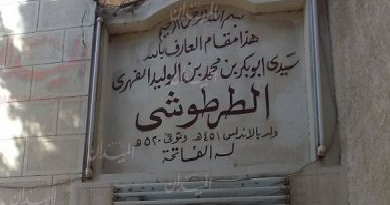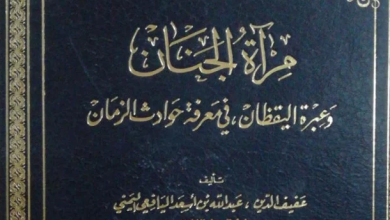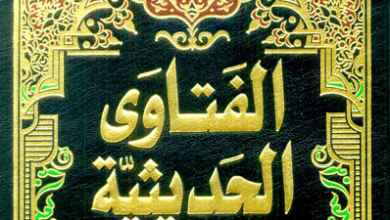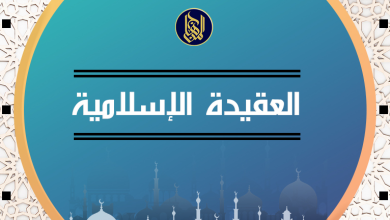Issues Related to the ‘Aqida of Imam Ibn ‘Abdal-Barr (d. 463 AH)
Al Hafiz Ibn ‘Abd al-Barr (d.463H) was a renowned specialist in Hadith affiliated to the Maliki madhhab. Al Qadi ‘Iyad (d.544H) said of him: “His name is Yusuf ibn’ Abdi Llah Ibn Muhammad Ibn ‘Abd al-Barr al-Numayrî. The Hafiz, the Shaykh of the scholars of Al Andalus, one of its great scholars of Hadith in his time, and one that had the greatest memory of the Sunnah.” [1]
Despite his important status as a specialist in hadith sciences and as a Maliki jurist, he was known to hold contradictory opinions in ‘aqidah and did not master this subject [2]. His beliefs were subject to criticism due to some of his statements in explanation of the Hadith of Descent and elsewhere, and he was even accused of anthropomorphism by some because of this. The Hafiz and Imam of his time, Zayn al-Din Al ‘Iraqi (d.806H) said about him: “He is one of those who ascribed direction to Allah, beware of him [in the realm of belief].“[3] And as mentioned by Taj al-Din Ibn Al-Subki (d.771H) via his citing of a fatwa of Qadi Ibn Jahbal al-Kilabi (d.733H): “Concerning what Abu `Umar ibn `Abd al-Barr said, both the elite and the general public know the man’s position and the scholars’ disavowal of if. The Malikis’ condemnation of it, from the first to the last of them, is well-known. His contravention (mukhalafa) of the Imam of North Africa, Abu al-Walid al-Baji (d.474H), is famous… “[4]
That said, if Al Hafiz Ibn ‘Abd al-Barr’s statements apparently attribute place and direction to Allah, these same words can be understood otherwise, absolving him of the anthropomorphism of which he is accused. In addition, his statements in numerous other places are in line with those of Ahl al-Sunnah exalting Allah (exalted be He) from any resemblance of His Noble Essence with that of His creation.
His Statements on the Hadith of Descent:
Our Lord – Blessed and Exalted is He! – descends every night to the lowest heaven in the last third of the night and says: Who is supplicating Me so that I may answer him? Who is asking forgiveness from Me so that I may forgive him? [Bukhari, Muslim and others]
The Hashwiyyah are fond of quoting Ibn ‘Abd al Barr’s explanation of the Hadith of descent in his book Al-Tamhîd some excerpts of which were translated in an important article by Dr. GF Haddad:
The hadith [of Allah’s descent] provides evidence that Allah is in (fi) the heaven, on (`ala) the Throne, above (fawq) seven heavens, as the Congregation (jama`a) said, and this is part of their proof against the Mu`tazila and the Jahmiyya‘s claim that Allah is in every place and not on the Throne….
Part of the right owed Allah’s Speech is that it be taken in it literal sense (`ala haqiqatihi), until the Community concurs that what is meant is the metaphorical meaning, when there is no way to follow what is revealed to us from our Lord except in that way….
Istawa is known in the language and understood to be height (`uluw), rising above something, fixity in a place (al-tamkin), and settledness in it (al-istiqrar fih)…. and istawa is “settledness in height” (al-istiqrar fi al-`uluw). Allah said to us: “That you may mount upon (tastawu) their backs, and may remember your Lord’s favor when you mount (istawaytum) thereon” (43:13), “And it (the ship) came to rest (istawat) upon (the mount) al-Judi” (11:44), “and And when you are on board (istawayta) the ship, you and whoso is with you” (23:28).37
This statement attracted criticism from various Imams such as the Hanbali Ibn al-Jawzi who in his book Sayd Ul Khatir said:
“And I was surprised by an Andalusian man named Ibn ‘Abd Barr. He wrote the book “At Tamhîd” and mentioned the hadith of the descent [of Allah] in the sky of our world, and then said: “This proves that Allah is on the Throne, for without it , His Word “It comes down” would have no meaning. “
These are the words of a man ignorant of Allah (may He be exalted), because it is based on what he knows of this physical world as in a lowering of the body and drawing from this analogy with the Attributes of Allah. … “
However, upon closer analysis it is clear that Ibn ‘Abd Barr did not intend descent in a physical sense when taking into account other statements of his which are much clearer.
In Qadi Ibn Jahbal al-Kilabi’s ‘Refutation of Him Who Attributes Direction to Allah’ (p. 251), the Qadi states:
To proceed, he [Ibn ‘Abd al-Barr] said, “Allah, azza wa jal, is in the heaven, on the Throne, above seven heavens” but he did not pin down what is meant by “in the heaven, on the Throne, above seven heavens”. Further Ibn ‘Abd al-Barr neither interpreted those terms figuratively, nor said anything like the impostor’s claim that what is meant by the Throne and the heaven is but the upward direction.
Crucially Qadi Ibn Jahbal clarifies that the statement is not necessarily an affirmation of direction for Allah. Such statements and their like have already been discussed in the article: The Creed of Imam Bukhari and the Salaf Quoted in Khalq Af’al Al-Ibad. They are in refutation of the “the Mu`tazila and the Jahmiyya‘s claim that Allah is in every place“ as Ibn ‘Abd Al-Barr says himself. This is not the belief of the Ash’aris.
Of course nobody can deny that Ibn ‘Abd al-Barr was criticized by numerous scholars but we should understand that none of the people of knowledge was protected from speech or criticism of another against him.
Some of what refutes the charge of anthropomorphic literalism against Ibn ‘Abd Barr will follow through excerpts of his own words.
His Rejection of Allah’s Descent bi dhatihi and his Acceptance of a Viable Interpretation (ta’wil)
He said (may Allah have mercy on him) in his book At Tamhîd (7/144) in response to those who interpreted the hadith of descent as the descent of the Essence [of Allah]:
“This is rejected [laysa bī shay’in] according to the people of understanding among Ahl al-Sunna because it is a modality [kayfiyya], and they flee from that because it is only suitable for something that is directly encompassed, and Allah, the Exalted, is transcendent above that.”
His rejection of linking descent to Allah’s Essence is consistent with the opinion of all the scholars (al Jumhur) and differs with the opinion of the Hashwiyyah.
He also said in his book Al Istidhkâr (2/530):
“And a group ascribed to the Sunna said that He, the Exalted, descends with His Essence (bi dhatihi)! This statement is rejected, because He, Exalted is His mention, is not a locus for movement and He has nothing from the signs (characteristics) of the creation.”
He mentioned in At Tamhîd (7/143) the narration of Imam Malik saying “what descends is His Order and His Mercy” without objecting to this account on the basis of its chain of narration (al-sanad ) nor its text (al matn). He presented the narration saying: “And people among the Muhaddithîn (Ahl al Athar) also said that His Order and His Mercy descends down. “
Then he quoted his chain of transmission of this story going back to Imam Malik … and commented on the story by saying, “And it is possible that it is as in the words of Malik (may Allah have mercy on him) namely that what descends is His mercy and His decree, accompanied by forgiveness and acceptance [of the prayers], and that this takes place more at that time compared to other times. And Allah knows best. “
It is therefore clear that he agrees with this interpretation. Ibn Rajab in Fath al-Bari (9/279) acknowledges this fact saying “a part of Ahl al-Hadith had inclined towards [Ta’weel] regarding the Hadith of Descent, specifically, among them: Ibn Qutaybah, al-Khattabi, and Ibn Abd al-Barr….”
More Examples of the Ta’wil of Imam Ibn Abdal-Barr
Ibn Abd al-Barr said in Al-Tamhîd (7/137):
“His ‘coming’ is neither a movement nor a disappearance nor a displacement, for all this is only valid for a body or substance. As it is established that He is neither a body nor a substance then it follows that His coming is not to be understood as a movement or displacement. And if you contemplate on this by taking into account expressions such as “so and so’s time has come,” or “death has come to him” or “disease came to him” and so on which occurs to man without their having to ‘come’ in a literal sense, then you will understand. “
Here, Ibn ‘Abd Barr uses the terminology of mutakallimin as he mentions substance, accidents and body and then denies them for Allah, as he also denied motion and movement, and this is consistent with the opinion of the majority and clearly diverges from the position of the hashwiyyah.
And he also said (may Allah have mercy on him) in Al Istidhkâr (8/596):
“Mi’âmar narrated from Ayyub, from Al Qasim Ibn Muhammad, from Abu Hurayrah who said “Certainly Allah accepts charity if it comes from what is halal and He takes it with his His Right.“ Regarding his word “His Right” This is a metaphor (majaz) and an eloquent speech expressing acceptance of charity by Allah, and his taking it is His acceptance; And there is nothing like Unto Him, yet He is the Hearing, the Seeing . “
Ibn Abd Al-Barr also said in Al-Tamhid 18:345
‘And as for his statement (Allah ‘laughs’), it means He has mercy on His servant at that, and receives him with repose, comfort, mercy and affection; and this is a well-understood metaphor.’
Salafi shaykh Hamd Al-Tuwaijiri (of King Sa’ud University), after rejecting Ibn Abd Al-Barr’s statement comments:
‘However, perhaps Ibn Abd Al-Barr can be pardoned for this; he explained the Attribute as per one of its [various] connotations and considerations, and this is warranted according to the Salaf.’
In his book Al Istidhkâr (5/213) in the chapter on what has been said about the night prayer, the Imam commented on the hadith of the Prophet (Peace and blessings of Allah be upon him) who said: God, Exalted be He, does not grow weary until you grow weary. He said:
“This means that whoever grows weary and abandons (the night prayer), his reward/recompense ceases with it. And it is known that Allah does not grow weary but that people grow weary, and that fatigue can affect them (May He be Exalted from this by a great Exaltation), but the expression of the hadith came in a form that is common in the language of the Arabs, because when they put a word in front of another word, in response to this term of reward, they mention it by the same term, even if it differs from it in what is intended. “[5]
This is correct and the way of the Ulema has been consistent in referring to the rules of rhetoric in the Arabic language and have named this a mushakala or verbal echo. This view is, of course, divergent with that of the hashwiyyah who attribute Allah with boredom/ weariness. [6]
His Position Towards ‘Ilm al-Kalam
Another statement the Wahhabis like to quote is found on the Salafi Publications website. This is a statement Imam Ibn Abdal-Barr reported from Ibn Khuwayz Mindad who alleges that according to Imam Malik the Ash’aris are somehow innovators.
The Haafidh of the west and its outstanding scholar Ibn Abdul Barr reported with his chain of narration from the scholars of the Maalikees in the east, Ibn Khuzaimah, that he said in the book of witnesses (Kitaab us-Shuhudaat) in explanation of the saying of the Maalik that it is not permissible to accept the witness of the people of innovation and innovated sects, and he said: “The people of the innovated sects in the view of Maalik and the rest of our Companions are the people of theological rhetoric (Kalaam). So every person of the theological rhetoric is from the people of the innovated sects and innovation: whether he is an Ash’aree, or other than an Ash’aree, and his witness is not accepted in Islaam ever. Indeed he is to be ostracized, and punished for his innovation and if he persists in it and repentance is to be sought from him”
Firstly, its not Ibn Khuzaimah – it is Abu `Abd Allah Muhammad ibn Ahmad ibn Khuwayz Mindaad al-Basri.
About him, see what Dr. GF Haddad said:
1. Abu `Abd Allah Muhammad ibn Ahmad ibn Khuwayz Mindaad al-Basri did narrate hadith but he did not become known as a Muhaddith, much less a Hafiz but was one of the Jurists and Usuliyyun of the Malikis.
2. Ibn Khuwayz Mindaad died in 390. He is NOT a companion of Imam Malik but came 200 years and seven biographical layers later. When he says “Maalik said…” he is not a reliable source unless he is confirmed independently. This, even if he produced his chain to Malik’s supposed statement; what then if he does not even have a chain!
3. Ibn Khuwayz Mindaad’s reports from Maalik “contain anomalies” and he “contradicts the Madhhab in both Fiqh and Usul nor do the [Maliki] experts rely on his positions” according to al-Qadi `Iyad (d. 544) in Tartib al-Madaarik (Moroccan ed. 7:77-78). `Iyad also said: “He was not insightful in his positions nor strong in fiqh. Abu al-Walid al-Baji said of him: I never heard him mentioned once by the Ulema of Iraq.”
4. `Iyad also exposes Ibn Khuwayz Mindaad as an extremist in his anti-kalam stance: “He alienated the Mutakallimin of Ahl al-Sunna and ruled that all of them were among the people of vain lusts (ahwa’) concerning whom Malik said his famous statement on [avoiding] their marriage, [rejecting] their witness and leadership, and alienating them.” Ibn Farhun (d. 799) cites all of the above in al-Deebaaj al-Mudhahhab (#491).
5. Imam Malik meant the Mu`tazilis and their sub-sects by consensus in the statement in question, as is made clear (among other sources) by Ibn `Abd al-Barr himself in his report from the same Ibn Khuwayz Mindaad in the previous page cf. Jaami` Bayaan al-`Ilm wa Fadlih (1994 Saudi ed. 2:942-943 #1800). It is known that Imam Malik never retained any Mu`tazilis, Qadaris, or Khawaarij in his Muwatta’ as narrators, while the Two Shaykhs (al-Bukhari and Muslim) and their students such as Imam al-Tirmidhi did narrate from Qadaris and even Jahmis. See on this the relevant chapter in Imam al-Suyuti’s Tadrib al-Raawi.
6. Clearly, the misguided view Ibn Khuwayz Mindaad expressed in including the Ash`aris among the people of innovation was rejected by his own School and is not considered in the least valid by the major Maliki Huffaz and Fuqaha’ such as Qaadi `Iyaad, al-Maazari, Abu Bakr ibn al-`Arabi, Abul-Walid al-Baaji, al-Qurtubi, and others – all thorough Ash`aris
This statement was also discussed in the article: The Position of the Juristic Schools Concerning the Ash’ari school
1. Applying the statements of the great Imāms such as Mālik and others to the Ash’arīs is a mistake. Imām Abūl Hasan al-Ash’arī was born after the death of Imām Ahmad—who was the last of the four Imāms—not to mention Imām Mālik. The people of theological rhetoric in the time of Imām Mālik were the Jahmiyya and Mu’tazila who had espoused falsehood. Their intent was not to defend the creed of the people of truth or give it victory. Imām al-Bayhaqī responded to this misconception when he said:
Allāh knows best, but by theological rhetoric, they only meant the theological rhetoric of the people of innovation. During their epoch, it was only the innovators that were known for theological rhetoric. As for Ahl al-Sunna, very infrequently did they engage in theological rhetoric until they were obliged to do so afterwards.
2. The opponent used the words of Ibn Khuwayz Mindād al-Mālikī against the Ash’arī school, yet the reality is that he was not considered reliable in his knowledge or citations.
Hāfiẓ b. Hajr al-‘Asqalānī said in Lisān al-Mīzān:
He possesses odd (reports) from Mālik and personal opinions and interpretations that the elite of the school did not reach , such as his view that the slaves are not included in the (Divine) address directed to free people, and that the singular report (Khabar al-Wāhid) benefits knowledge…
…Abūl Walīd al-Bājī spoke ill of him stating that he was not skilled in investigation, nor was he strong in jurisprudence. He used to claim that in the school of Mālik, it is not permissible to witness the funeral prayer of a practitioner of theological rhetoric, accept their testimony, marry them, or entrust them. Ibn ‘Abd al-Barr also criticized him as well.
Imām Abūl Walīd al-Bājī said concerning him:
I did not hear any mention of him among the scholars of the Iraqis. He used to completely shun theological rhetoric and have aversion towards its people, so much so that this led to loathing of the practitioners of theological rhetoric among Ahl al-Sunna. He ruled that the people of theological rhetoric were people of desires, concerning whom, Mālik said what he said with regards to their testimonies and marriages.
Qāḍī ‘Iyāḍ said concerning him: “He possesses oddities from Mālik. He also has personal legal views that the erudite of the school did not reach . He was not skilled in investigation, nor was he strong in jurisprudence.”
So this is the view of some of the leading Mālikī scholars and jurists, such as Ibn ‘Abd al-Barr, al-Bajī, and Qāḍi ‘Iyād, not to mention the view of one of the leaders in al-Jarh wal-Ta’dīl (criticism and lauding of Hadīth narrators), Hāfiẓ b. Hajar. Likewise, there is no doubt that most of the Mālikī jurists are Ash’arīs.
Finally, despite Ibn Abdul-Barr narrating this rejected statement his own position towards Ilm al-Kalam is made clear in the same book of Imam Ibn Abdal Barr the Salafis quoted from i.e Jami Bayan il-Ilmi wa Fadlihi. He explains that there is a difference between a time when there is no need and when there is a need for the mutakallim to repel the lies of the deviants. Ibn Abd Al-Barr said:
‘….as for the jama’ah (community) they are upon the opinion of (Imam) Malik, Allah have mercy upon him, except where one is compelled to engage in kalam, as there is no room to remain silent when desiring to refute falsehood and turn its advocate from its school or where there is fear of its general influence on the masses, or something to that effect.’
Hence, his own position towards kalam is a moderate one in keeping with that of the majority of Sunni ‘Ulema.
Conclusion:
Whilst the aim of this article is not to sweep under the carpet any valid criticism the Imam received for certain statements of his that were considered problematic, it remains important to highlight that when taking his other clear statements into account it is obvious to all how far he was from the beliefs of the Wahhabi / pseudo-‘salafis’ of today who like to selectively quote him when it suits their twisted agenda.
O Allah! Restore the honor of Hafiz Ibn ‘Abd al-Barr and allows us to focus on the truth that he has transmitted by Your grace and forgive our mistakes and show us mercy here and in the hereafter and save us from Your anger and Your punishment. Allahumma amin. [7]
Notes:
[1] Tartîb Ul Madârik of Qâ d î ‘Iya d Ibn Musa Al Ya hs UBI.
[2] See also the comments of Sh. Sa’id Foudah here: http://www.aslein.net/showthread.php?t=301
[3] See Tahr Ut Tathrib.
[4] See Tabaqât Shâfi’iyyah Ush Al Kubra of Imam Taj Ud Din Ibn As Subki.
[5] This means that the Arabs sometimes use the same word in the same sentence for the needs of eloquence without the same term used having the same meaning. Here in the hadith cited, the word “malal – weariness / boredom” is used twice in the same sentence, but not in the same meaning: the first word “malal” is used in the literal sense for humans, and the second is used metaphorically (majaz) befitting the magnificence of Allah. Here we see the difference between the Wahhabis who attribute to Allah “weariness” and Imam Ibn ‘Abd al-Barr who exalts Allah of that, and so we see that ht has the same position as all the Sunnis and that Wahhabis are really deviant in their attributing to Allah attributes of such imperfection! Will they dare declare Imam Ibn ‘Abd Barr a mu’âtil as they do with other Ash’arites for doing ta’wil of “weariness” in this hadith?
[6] Adapted from تفنيد الإعتداد بغرائب بن خويز by Shaykh Al Azhari. Book translated in French at the following link: http://www.aslama.com/forums/showthread.php/34020-R%C3%A9futation-de-la-parole-d-Ibn-Khouwayz
[7] A large portion of this article was translated from: http://www.at-tawhid.net/article-la-veritable-croyance-de-l-imam-ibn-abd-al-barr-al-azhari-78392724.html
Thanks to – HERE






Please update all the links from Marifah.net to Marifah.info. This is now the new domain, as the previous one was lost and we couldn’t recover it yet.